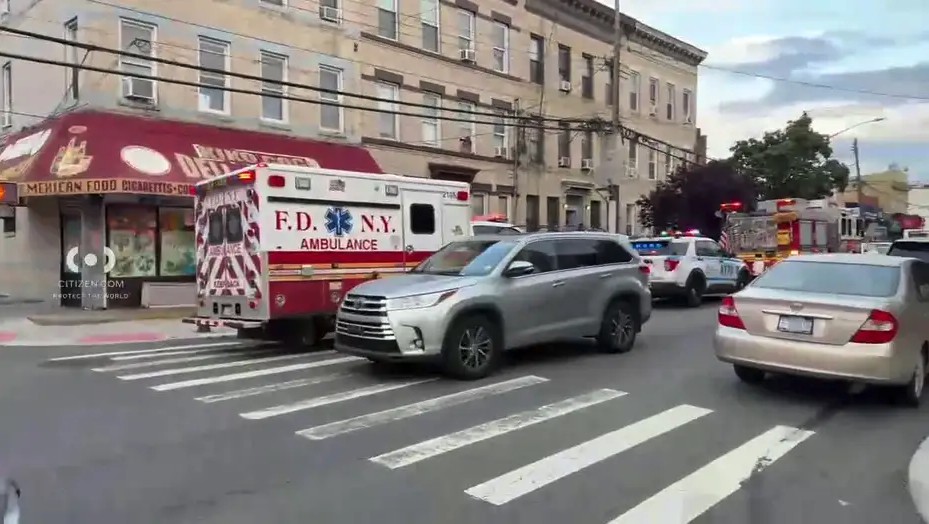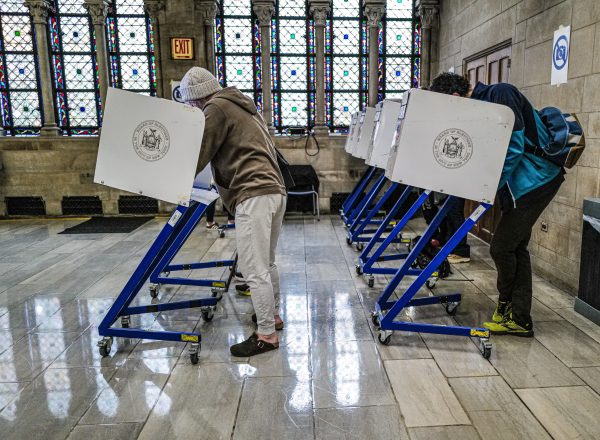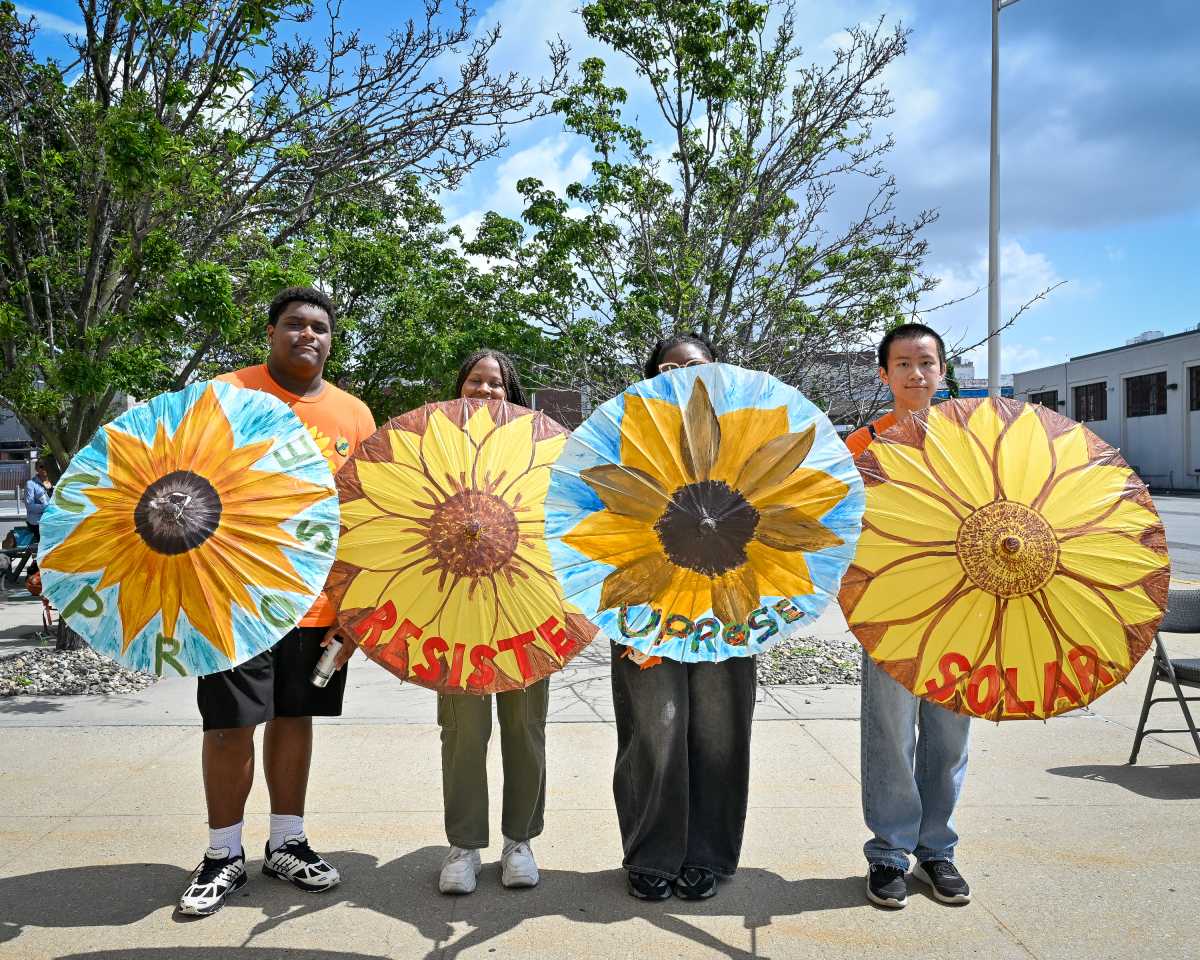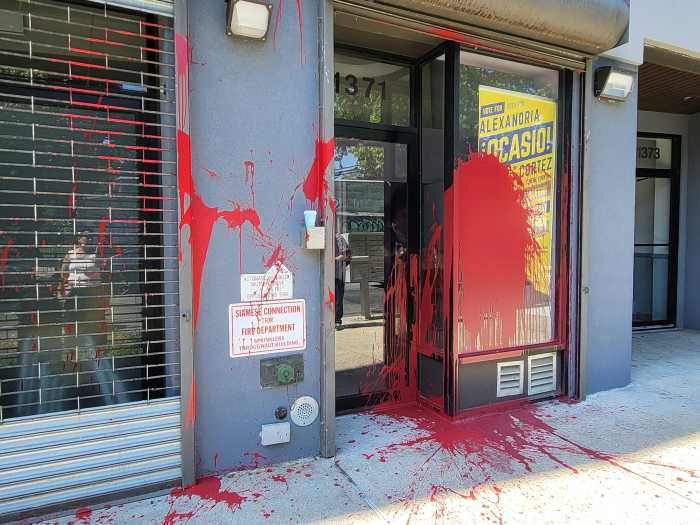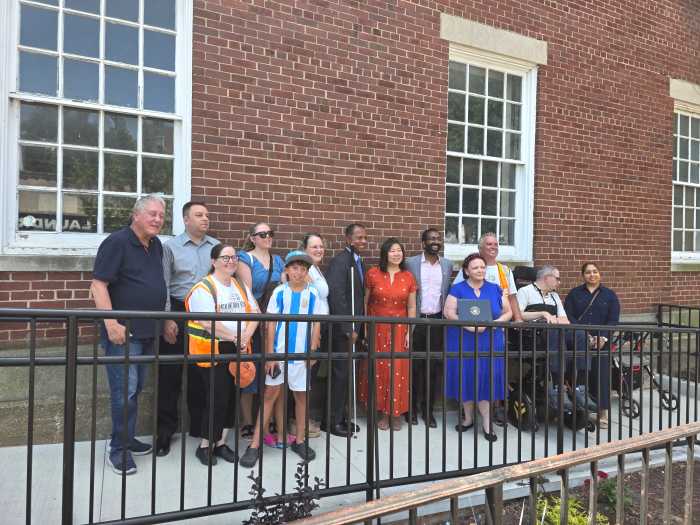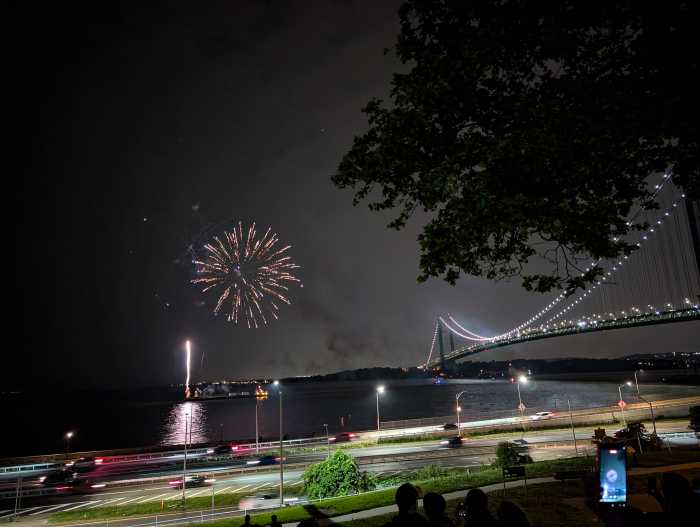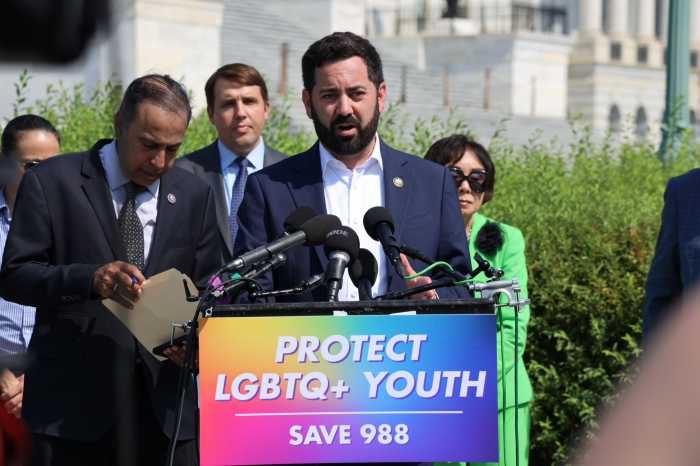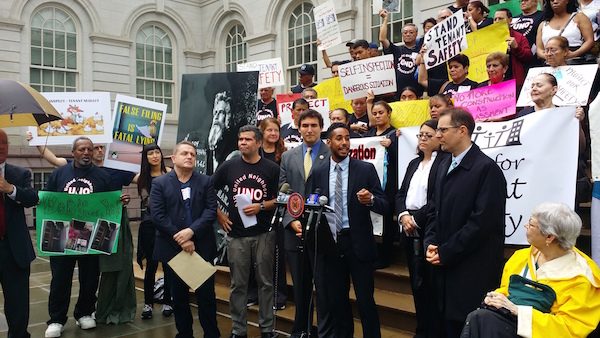
BY EILEEN STUKANE | The New York City Department of Buildings (DOB) and the New York City Department of Housing Preservation and Development (HPD) must be feeling the heat. The New York City Council, state elected officials, and activist groups — especially Stand For Tenant Safety (STS), a Lower East Side-based tenants rights/legal services coalition, and Chelsea’s Community & Residents Protection Working Group (CRP) — are targeting tenant harassment by landlords.
The DOB and HPD have been alerted to the property-over-people attitude of landlords who want to empty buildings in order to gut, renovate, and raise rents. Landlords are pressuring tenants to take buyouts, turning empty apartments into illegal hotels, subjecting tenants to what the STS calls “construction as harassment,” and, according to the CRP’s findings, landlords are obtaining DOB construction permits by falsifying information on applications. They alleviate themselves of the need for creating tenant protection plans by noting “unoccupied” for buildings that are most certainly occupied.
A powerful legislative move was recently taken by the City Council when it introduced a package of 12 bills, with 11 councilmembers signing on, to force the DOB to overhaul its penalty system for violations, and to take on more oversight of tenant protection plans, the issuing of building permits, and DOB inspections.
One bill introduces the formation of an inter-agency task force to evaluate the construction and renovation by landlords in occupied residential buildings, publish findings, and share information. Another bill creates a Real Time Enforcement Unit in which the DOB would conduct inspections to investigate construction complaints where work is being done without a permit, or where work is being done with a permit on 10 percent or more of a floor of a building, or on an addition.
Just weeks before these city bills were introduced, however, a long-anticipated meeting between New York State elected officials took place in the offices of the DOB.
FORCES FROM THE STATE
On Sept. 18, NY State Assemblymember Richard Gottfried and NY State Senator Liz Krueger met with DOB Commissioner Richard Chandler and his deputies. Also in attendance were NY State Senator Brad Hoylman, City Counclimembers Helen Rosenthal and Corey Johnson, and Manhattan Borough President Gale Brewer, as well as a representative from Mayor Bill de Blasio’s legislative office.
Gottfried told Chelsea Now the meeting “was the best aspect of the meeting, because my sense was that the Mayor’s office, until that point, did not appreciate some of the concerns, and I think it was very valuable that the Mayor’s office was an eyewitness to the meeting.
The meeting, according to Gottfried, was “frustrating.” He explains that the “DOB did not seem interested in taking any of the steps that we all felt were important. They were not interested in revoking permits that had been granted on the basis of fraudulent paperwork, [and] did not seem particularly aggressive about pursuing criminal cases against people who had filed fraudulent paperwork to get permits.” Gottfried’s office was urged not to invite HPD to the meeting, but as he says, “It was clear in the meeting that it would have been helpful to have HPD [which enforces tenant protection plans] there.”
The subject of DOB’s penalties arose. Gottfried pointed out that the DOB’s current fines have no impact, since landlords — if they move out current tenants and raise the rent from $1,000 a month to $5,000 — can easily make up a $5,000 fine for breaking the law within just a few months. “I don’t think the DOB has any sense of the harm that their weak enforcement causes,” says Gottfried.
As for the DOB’s response to the meeting, a statement from its spokesman notes: “Under this administration, the Department has sought out and taken aggressive enforcement action against building owners that intentionally engage in nuisance or dangerous construction to harass tenants. Working with HPD, we’ve inspected and enforced violations at hundreds of sites to hold non-compliant owners accountable….We will continue to work on this issue with local elected officials where necessary, and welcome any discussion on ways the Department can enhance its efforts to protect tenants and keep buildings safe.”
The DOB also acknowledges that its dialogue with elected officials will remain ongoing, and officials will be updated on progress being made on the issue of identifying and disciplining bad landlords.
Gottfried hopes to have a follow-up meeting with the DOB that includes HPD, the Mayor’s office, and the NY State Department of Homes and Community Renewal (DHCR).
“The DOB essentially said, ‘We hear what you said. We’ll see what we can do and we’ll reconvene,’ ” says Gottfried. He adds, “What concerns me is that they [DOB officials] came into the meeting thinking that they were already doing a lot, and when we asked about stronger steps, they said their hands were tied. I think that reflects a very narrow and weak-willed view of their powers.”
FORCES FROM THE CITY
While state officials were meeting with DOB officials, and CRP was continuing to monitor falsified DOB permit applications that allowed construction to take place and drive tenants from their homes, STS was growing in force and number. Today, it is a coalition of 23 tenant rights and legal services organizations.
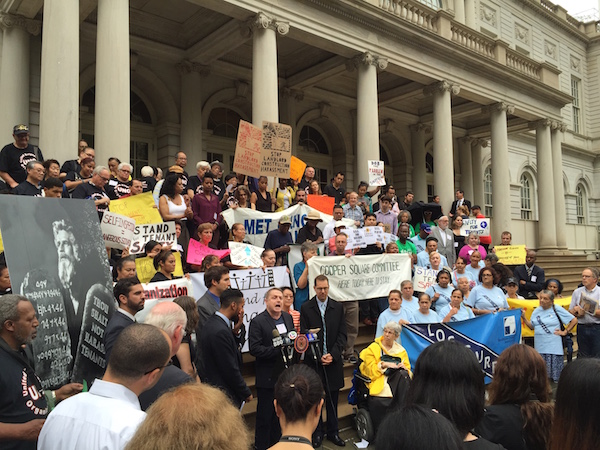
Betsy Eichel, who is a tenant organizer for Housing Conservation Coordinators (HCC), a member of the STS coalition, is also a media spokesperson for STS. She saw the results of the impressive tenant survey that STS undertook. The survey received 150 respondents, and shined a light on tenant harassment.
“Once we [STS] had that [survey responses], and at the same time were reaching out to elected officials in the districts where these were huge issues, that eventually led to the creation of the proposed City Council laws,” says Eichel.
“Legislators themselves, the Council members and their staff are responsible for drafting the bills, and deserve credit for that,” says Brandon Kielbasa, another spokesperson for STS who also notes, “We basically talked to those we knew, in the districts we knew were having problems, and then we talked to the different Council members who had taken on housing issues in the past and were likely to want to get involved in such a package. It was a combination of ideas. It was a collaboration.”
Councilmember and bill co-sponsor Helen Rosenthal says that tenant harassment is profound on the Upper West Side.
“Because the market is so hot, we’ve lost roughly 650 units a year over the last five years due to harassment or buyouts or evictions, all of which are against tenants’ rights. The tenant has a right to live there harassment-free,” she asserts. The bill she is sponsoring with Councilmember Corey Johnson requires the DOB to provide written notice of construction plans — at least 30 days before a permit is issued — to the Borough President, local Councilmember, and local Community Board. “That way we would know that people live there, and we could, even before construction began, could say we have to have a tenant protection plan if they’ve lied on their application,” says Rosenthal.
Also in the bill is a doubling of the cost of penalties for violations. “And every time the DOB has to come out to inspect a complaint-based inspection, that cost will be pushed back to the landlord. The city won’t have to pay for those inspections,” says Rosenthal.
Councilmember Corey Johnson adds, “The reason you’ve seen this packet of bills introduced into the Council is because tenants across New York City are really crying out for help. With real estate prices at record highs there are some unscrupulous landlords who will stop at nothing to force tenants out of affordable rent regulated units.”
“We’ve asked the Department of Buildings to take a more proactive role when it comes to combating landlord/tenant harassment,” Johnson adds, noting that he has been working with advocates, tenants, City Council colleagues and local state legislators to address this urgent problem.
WHAT HAPPENS NEXT
The dozen bills introduced by the City Council are assigned to the Council’s Committee on Housing and Buildings, which is chaired by Councilmember Jumaane Williams. At his discretion, the chair schedules a hearing where the bills will be heard. Johnson explains that at the hearing, “The DOB will come and testify on what their thoughts are on those bills. The public can testify as well, tenants and nonprofit organizations, and others who have interest in the legislation.”
After the hearing, there are a number of months when the Council negotiates the bills with the administration and the DOB, and consults with other interested parties. Once there’s agreement on the final bills, another hearing is scheduled to vote on them as they were presented at the first hearing, or as they have been modified.
Then, the Committee votes. If the bills pass Committee, they will be assigned to the next stated full meeting of the Council after that Committee hearing, to be voted into law.
The timing of the process is unpredictable. Some bills can be voted into law in three to six months. For these bills, the first committee hearing has yet to be scheduled.
STS’s Kielbasa is ready. “We’re really harnessing the power of the community,” he says. “All those tenants coming to us want to be part of it, want to come to the hearings with us, want to testify. The tenants really need a place at the table. It’s terrible, dangerous, physically and psychologically threatening to have your building used as a tool against you.”
For tenants who feel they are being harassed, Councilmember Rosenthal advises to call 311 to report your situation. Get a complaint number. Your local Councilmember’s office can help you follow up with that number.



